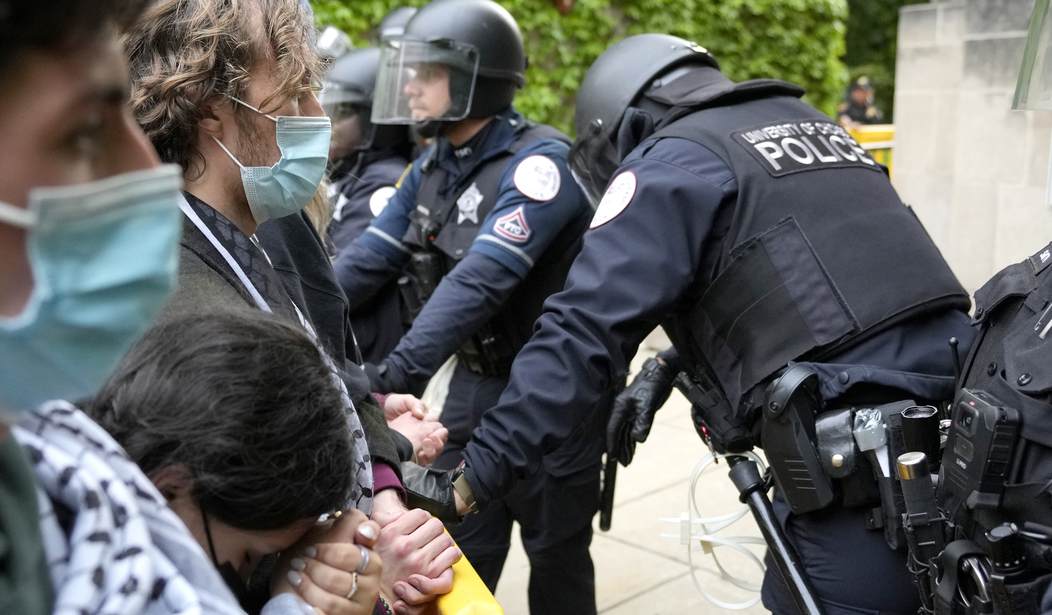Earlier today I wrote about police stepping in to clear another pro-Palestinian encampment, this time at UPenn. But that was one of just one of three camps cleared today.
Tent encampments at the University of Pennsylvania, the Massachusetts Institute of Technology (MIT) and the University of Arizona, Tucson, were all dismantled in early morning raids that saw cordons of police sweep in and clear the makeshift protest settlements. In Tucson teargas was used, and demonstrators responded by throwing bottles at officers...
In Cambridge, Massachusetts, about 100 police officers moved in at 4am on Friday and began clearing the protest site at MIT of tents, tarps and flags. Demonstrators chanted nearby...
Some of the most violent scenes to erupt in the early hours of Friday occurred at the University of Arizona, Tucson. Police fired pepper balls at protesters who carried homemade shields made of wooden pallets, and teargas was used to clear the encampment.
The encampment at GWU was cleared Wednesday and several others were cleared earlier in the week including at the University of Chicago, USC and a university in Amsterdam. You can add to this a bunch of schools who did the same last week: PSU, Columbia, NYU, CCNY, the New School, UCLA, UT-Austin, etc.
Of course none of this means the protest camps are over. Students and professors are fighting back and it remains to be seen who will win the battle of wills in the end. Nevertheless, it's clear that there is substantial pushback to the encampments coming from left-wing administrators. This is joining up with the pushback on DEI coming from the right and it's starting to have an impact. Over at Tablet, Richard Hanania argues this may be a sign that things are changing.
These are signs that changes are afoot. They’re not taking place at the same pace everywhere, and some departments, fields of study, and universities might be sinking deeper into a left-wing monoculture. Nonetheless, there is at least variation in how institutions are behaving, which appears to be the result of two processes. First, Republican politicians have actually started paying attention to what is going on at university campuses and, more important, become willing to do something about it. More subtly, at the same time there has been a great discrediting of higher education, particularly elite universities, and this inevitably affects the decisions of employers and potential students. Higher education is heavily regulated and propped up by massive government subsidies, making it far from a perfectly functioning market. Yet some market forces do exist, and there are clear signs that they are having an impact. Instead of a university monoculture, if we’re fortunate, in the coming years we’re going to see more cultural fragmentation, and this will create opportunities for institutions to act in accordance with their own self-interest and reject more and more aspects of DEI ideology...
All eight of the Ivy League schools made standardized tests optional during the pandemic. Already this year, Dartmouth, Yale, and Columbia announced that they are going to be mandatory again. If kids aren’t learning much, then the admissions process is all there is to signal to potential employers that hiring a graduate of an elite school is worthwhile.
The Ivy League schools that have brought back standardized tests are following the lead of MIT, which did so in 2022. Under the leadership of President Sally Kornbluth, the school also recently banned DEI statements in faculty hiring and promotion across all departments, indicating that it is trying to distance itself from the culture that has taken over similarly prestigious schools. The New York Times notes that, as a school famous for the quality of its scientific courses and research, MIT “has been in the forefront of pushing back against measures that some say could dilute the rigor of its education.” President Kornbluth in effect adopted the perspective of critics of diversity statements in explaining why she banned the practice, saying that “compelled statements impinge on freedom of expression, and they don’t work.”...
Over the next decade, universities are going to have a choice to make. They can either continue to remain beholden to a minority of activist professors, students, and administrators, or they can follow schools like the University of Chicago and MIT and forge a different path. When directly under the control of Republican lawmakers and governors, their choices will increasingly narrow. But private universities and even state systems under Democratic control will have to grapple with the question of what kinds of institutions they want to be. Along the way, they will be resisted by students who have already been programmed by the media and K-12 schools into accepting anti-Western narratives, and by professors and administrators who have little else going for themselves other than their self-images as defenders of the oppressed.
Hanania is optimistic but he's not delusional. He doesn't think, for instance, that we're likely to see common sense returning to the University of California anytime soon. In places where the state can back up the academic monoculture there's not much hope for change. Still, even having pushback in red states and in some blue states is a real improvement. You'll never really stop campus extremists from pursuing their long march through the institutions but you can slow them down if you're willing to stand up to them. That's what we're seeing happen this month across the country.







Join the conversation as a VIP Member